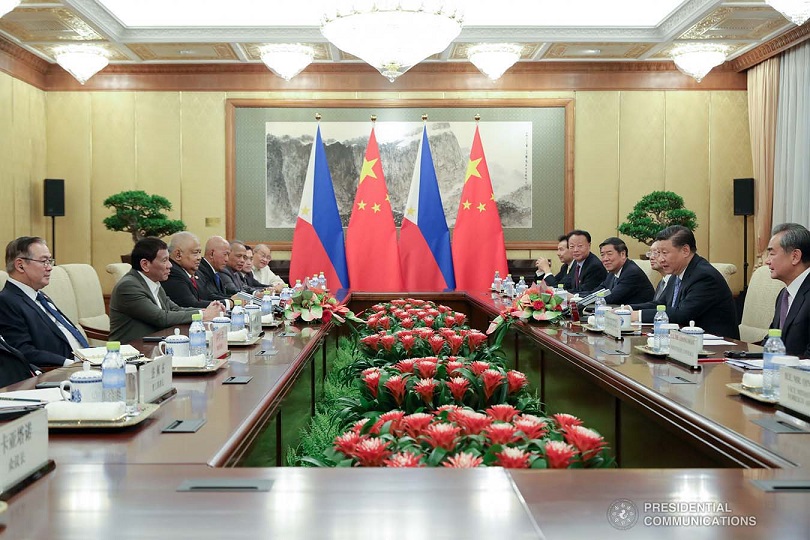
Bilateral meeting between Philippine and Chinese officilas led by President Duterte and President Xi Jinping at the Diaoyutai State Guesthouse in Beijing on August 29, 2019. Malacanang photo by Robinson Ninal.
The most important documents that were exchanged between the Philippines and China during last week’s visit of President Duterte to China were not included in the list of six agreements signed that was released by Malacañang to media.
The documents were the list of names that will constitute the Inter-governmental steering committee that would supervise the joint exploration between the Philippines and China in the West Philippine Sea.
CNN Philippines was able to get the document submitted by China. CNN PH said “A highly-placed source gave CNN Philippines a document showing seven members from the Chinese side, to be led by Vice Foreign Minister Luo Zhaohui as co-chair and Vice Minister Li Fanrong of the National Energy Administration as co-vice chair. The other members are:
• Hong Liang, Director General of the Department of Boundary and Ocean Affairs, Ministry of Foreign Affairs
• Shen Minjuan, Deputy Director General of the Department of Asian Affairs, Ministry of Foreign Affairs
• Gou Haibo, Counselor of the Department of Treaty and Law, Ministry of Foreign Affairs
• Liang Jinzhe, Deputy Director General of the Office of Foreign Affairs Commission of the CPC Central Committee
• Liu Hong, Deputy Director General of the Department of Oil and Gas, National Energy Administration
CNN PH also reported that“the Philippine delegation is composed of eight officials – the co-chair and co-vice chair plus three other members from the Department of Foreign Affairs, and one each from the Department of Energy, Department of Justice, and the National Mapping and Resource Information Authority.”
The composition of the Steering Committee moves further forward the Memorandum of Understanding on Cooperation on Oil and Gas Development signed by Foreign Secretary Teodoro Locsin, Jr. and Chinese Foreign Minister Wang Yi in November 2018 during the visit of Chinese President Xi Jinping in Manila which was followed by the signing of the Terms of Reference, also by Locsin and Wang, last month.
The MOU stated that the two governments will establish an Inter-governmental joint steering committee and one or more Inter-Entrepreneurial Working Group, which will consist of representatives from enterprises authorized by the two governments.
The TOR, which is an implementing guideline to the MOU, states that a working group shall be deemedto have been constituted as soon as China receives and confirms the notice designating the Philippine enterprise or enterprises for the Working Group.
The Working Group, the TOR further states, shall have full power and authority to immediate commence discussion and negotiation on the inter-entrepreneurial commercial and technical arrangements agreed by the committee.
China designated the state-owned China National Offshore Oil Corporation as its representative in all working groups. The Philippines will designate the enterprise that has an existing service contract with the government in the area to be explored. The TOR states thatif there is no such enterprise, the Philippine National Oil Company – Exploration Corporation will represent the country.
Senior Associate Justice Antonio T. Carpio, who has been critical of the Duterte government’s submissive stance towards China on territorial and maritime disputes in the South China Sea but supports the MOU on joint exploration, said with the formation of the Working Group,“I think we are now in the third phase of the South China Sea dispute.
In earlier lectures, Carpio said he looks at the dispute in the South China Sea with China, which claims almost 85 percent of the vast body of water in three phases:
In the first phase, Carpio said, the Chinese asserted “indisputable sovereignty over the South China Sea.”
In the second phase after the Arbitral Court ruled in favor of the Philippines in 2016, the Chinese expressed willingness to “meet halfway.”
With the MOU, Carpio said we could be entering the third phase where China says “Okay, you have the sovereign rights but give us half of the income.”
The TOR does not specify a specific area covered but Duterte and other officials have mentioned about a 60-40 sharing in favor of the Philippines in the exploration of Recto Bank (international name is Reed Bank; Chinese name is Liyue Tan) in Palawan, within the country’s 200 nautical mile exclusive economic zone.
Recto Bankis adjacent toMalampaya gas field, which accounts for 20 percent of the country’s power supply but is expected to run dry in ten years.
In 2010, the government of President Benigno Aquino III, through the DOE awarded a Service Contract to explore Recto Bank to Forum Energy Plc. (FEP), majority shares of which is owned by. Philex Petroleum Corp, a mining company headed by Manuel V. Pangilinan.
Forum Energy had started the exploration in 2010 but stopped after Chinese vessels harassed their ships. A moratorium on the exploration in Reed Bank was also imposed by the Philippine government when the Aquino government filed a case before the Permanent Arbitration Court in The Hague. The moratorium remains unlifted up to now.
What does China get out of this joint exploration under a Service Contractafter all public statements of “sovereignty” in almostthe whole of South China Sea and its non-recognition of the Arbitral ruling?
They get 40 per cent of the what will be produced by the joint project and most importantly, they gain a foothold in Recto Bank, 85 nautical miles from Palawan.
For the Philippines, the most important is the implied recognition of the country’s sovereign rights in the area.
Carpio said all DOE Service Contracts state that the Philippines has exclusive sovereign rights over the gas/oil in the area awarded to the service contractor.
“The service contractor acknowledges that we own the resources,” Carpio stressed.
By entering into a contract to explore Recto Bank ,China in effect recognizes the sovereign rights of the Philippines over the area under the United Nations Law of the Sea (UNCLOS) and upheld by the Arbitral Court 2016 decision.